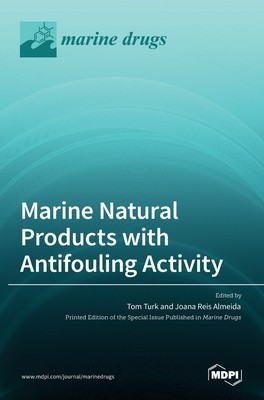
- We will send in 10–14 business days.
- Publisher: MDPI AG
- ISBN-10: 3036521453
- ISBN-13: 9783036521459
- Format: 17 x 24.4 x 1.4 cm, hardcover
- Language: English
- SAVE -10% with code: EXTRA
Marine Natural Products with Antifouling Activity (e-book) (used book) | bookbook.eu
Reviews
Description
Marine fouling affects most man-made surfaces temporarily or permanently immersed in the sea, causing important economic costs. Intense research is aimed at methods for preventing or reducing fouling development. The most widespread solution to inhibit fouling is to make surfaces unsuitable for settlers by coating them with antifouling paints containing toxic compounds. Most such antifouling agents give undesirable effects on nontarget species, including commercially important ones. The search for new nontoxic antifouling technologies has become a necessity, particularly after the ban of organotin compounds such as tributyltin (TBT), once the most widespread and used antifouling agent. Alternative organic and metal-based biocides are now used in antifouling paints, but their possible toxic effects on the aquatic environment are not yet fully understood. A nontoxic alternative for antifouling protection comes from the possibility of adopting natural antifouling compounds that are and may be found in marine sessile invertebrates like sponges, bryozoans, corals, and tunicates and in marine microorganisms. Such metabolites can prevent their producers from being fouled on by other organisms or be responsible for specific metabolic functions that may interfere with biofouling species adhesion. As natural marine compounds, they may inhibit settlement through a nontoxic mechanism without adverse effects to the environment. Such compounds could be developed into active ingredients of new antifouling coatings. So far, a rather limited number of natural products antifoulants (NPAs) has been isolated from marine organisms, but a huge reservoir of compounds with potential antifouling activity is hidden in marine organisms. The Special Issue on Marine Natural Products with Antifouling Activity aims at the discovery of such compounds their activity, toxicity and potential application in environmentally friendly antifouling coatings.
EXTRA 10 % discount with code: EXTRA
The promotion ends in 16d.21:24:03
The discount code is valid when purchasing from 10 €. Discounts do not stack.
- Publisher: MDPI AG
- ISBN-10: 3036521453
- ISBN-13: 9783036521459
- Format: 17 x 24.4 x 1.4 cm, hardcover
- Language: English English
Marine fouling affects most man-made surfaces temporarily or permanently immersed in the sea, causing important economic costs. Intense research is aimed at methods for preventing or reducing fouling development. The most widespread solution to inhibit fouling is to make surfaces unsuitable for settlers by coating them with antifouling paints containing toxic compounds. Most such antifouling agents give undesirable effects on nontarget species, including commercially important ones. The search for new nontoxic antifouling technologies has become a necessity, particularly after the ban of organotin compounds such as tributyltin (TBT), once the most widespread and used antifouling agent. Alternative organic and metal-based biocides are now used in antifouling paints, but their possible toxic effects on the aquatic environment are not yet fully understood. A nontoxic alternative for antifouling protection comes from the possibility of adopting natural antifouling compounds that are and may be found in marine sessile invertebrates like sponges, bryozoans, corals, and tunicates and in marine microorganisms. Such metabolites can prevent their producers from being fouled on by other organisms or be responsible for specific metabolic functions that may interfere with biofouling species adhesion. As natural marine compounds, they may inhibit settlement through a nontoxic mechanism without adverse effects to the environment. Such compounds could be developed into active ingredients of new antifouling coatings. So far, a rather limited number of natural products antifoulants (NPAs) has been isolated from marine organisms, but a huge reservoir of compounds with potential antifouling activity is hidden in marine organisms. The Special Issue on Marine Natural Products with Antifouling Activity aims at the discovery of such compounds their activity, toxicity and potential application in environmentally friendly antifouling coatings.


Reviews